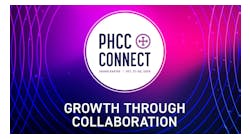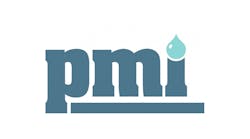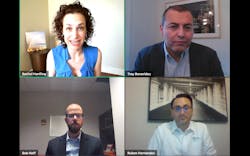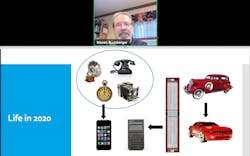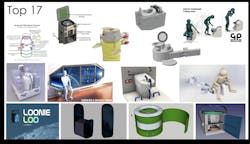Latest from Industry Event News
Sponsored
PMI20 Manufacturing Success Conference Held Virtually
The PMI20 Manufacturing Success Conference was held November 10th through 12th, and featured an array of speakers covering topics that ranged from "The Language of Leadership" and "Understanding the 2020 Election," to "COVID-19 and the New Norm." Due to concerns about the health and safety of both organizers and attendees due to the ongoing pandemic, the conference was held virtually.
Valek & Co., a public relations firm working for PMI, confirmed 76 member executives participated in the conference. The flexibility of the virtual format also allowed for a number of first-time attendees, who might not have been able to attend the conference in-person. "We had 20 first-time attendees," Ray Valek, President of Valek & Co. said. "The virtual nature of the conference enabled participation without the need to travel or take several days away from other work/life responsibilities."
Opening Day
PMI20 was kicked off with a warm welcome and opening remarks from Kerry Stackpole, PMI CEO and Executive Director, and Joel Smith, PMI Board President. It then fell to Dawn Qualley, Director for the International Code Council's Evaluation Service to introduce keynote speaker Rachel Hanfing.
Hanfing is an Emmy-nominated producer for such television personalities as Oprah Winfrey and Anderson Cooper. She began her session, "The Language of Leadership," talking about her introduction to the plumbing industry, first as a customer, then as a communications expert helping industry leaders refine their messages and their methods.
Hanfing also spoke to the unique moment the country is in, saying, "The greatest antidote I know to fear is action... I believe that the opportunity now is greater than ever." She discussed a few key elements of good communication, emphasizing that even a small improvement in communication skills can lead to great returns.
Hanfing then opened up her session into a discussion that included Troy Benavidez, VP of Public Affairs, LIXIL North America, Bob Neff, Product Compliance and Regulatory Manager at Delta Faucet Company, and Ruben Hernandez, Strategic Account Manager, CSA Group.
After a short break, the first day concluded with a presentation from Jim Ellis of Ellis Insight. Ellis is a 35-year veteran of politics at the state and national levels. He began his career with the San Diego County Republican Party, and then served as an original staff member for then-Congressman Bill Lowery (R-CA).
His session, "Understanding the 2020 Election," discussed some of the ongoing legal challenges to the presidential race, including different deadlines for vote certification in various states. He also discussed the outcome of the Senate races, where the Republicans look as if they will probably retain the majority, and House races, where the Democrats will retain their majority (despite a few unexpected losses). He also projected some small changes in state legislators and gubernatorial races that will most likely give the Republicans the edge in the redistricting battles that will likely follow the census.
Second Day
The second day of the conference began with a brief video postcard from Julie Coker, President of the San Diego Tourism Authority. While Coker understood the reasons for the conference being held virtually this year, she reminded attendees that, "there are better days ahead," and looked forward to welcoming PMI to her city in 2021.
After Joel Smith wished attendees a happy Veterans Day, Stephanie Salmon, PMI Consultant on Government Affairs introduced a group of speakers to give an update on the state of international trade: Robert Clifton Burns, Sr. Council, Even Y. Chuck, Partner, and David Stepp, Partner, from the law firm of Crowell & Moring.
Chuck opened the session by saying that many of the existing trends in international trade had only been accelerated by COVID. Most multinational corporations were rethinking their supply chain architecture and seeking new efficiencies and ways to optimize. Many American companies were re-visiting such practices as offshoring (manufacturing overseas) and outsourcing (sourcing goods and services from third-party providers).
The session provided a brief outline of various Section 301 cases against China and Vietnam. Also covered were various US laws and export controls, some of which are being "weaponized" by certain companies to use against their competition. Also touched on were the new difficulties in forming joint ventures. Companies were advised to proceed cautiously, particularly in light of new Chinese cybersecurity laws, and accusations of the Chinese use of forced labor (which, apart from the core business ethics concern, could be a public-relations time bomb waiting to explode). The need for verification and enforcement of anti-forced labor laws was stressed.
The conversation briefly touched on Brexit and its implications for the North American market.
In conclusion, while price used to be the main consideration for firms sourcing overseas, now greater attention needs to be paid to various trade agreements throughout the world to find the best long-term business relationships.
The day's second session was on Measurement Science Research Needs for Premise Plumbing Systems, with Andrew Persily, Ph.D., chief, National Institute of Standards and Technology, Energy & Environment Division.
The day's third session was "Hunter’s Curve Meets March Madness: Estimating Peak Demands in Premise Plumbing Systems," presented by Steven Buchberger, Ph.D., professor, College of Engineering and Applied Science, Department of Civil & Architectural Engineering & Construction Management, University of Cincinnati.
In his discussion, Dr. Buchberger discussed how Hunter's Curve, a formula created from data obtained in the 1940s, was still being used in plumbing system design today. New technology, particularly the new (and in many cases mandated) low flow fixtures, meant that it was painfully out of date for modern plumbing systems.
IAPMO had lead the charge to produce a new probability model, and new water metering techniques and devices meant that scientists had an amazing wealth of data to work with. IAPMO had detailed information on plumbing system use from 62 cities in nine states, including more than 1,038 households. IAPMO published their results in 2017, and they were still being examined and digested by the industry.
The results found an order of magnitude difference between the probability of use of clothes washers and dishwashers, as well as big changes in water flow for fixtures and big changes for flush tank type toilets.
Dr. Buchberger gave several concrete examples, offering water flow and pipe sizing calculations for both a large apartment complex and and single family home. He advised system designers to consult the Water Demand Calculator on the IAPMO website. The calculator is offered at no charge and runs on a simple spreadsheet.
Third Day
The opening session of the third day was "COVID-19 and the New Norm," a panel discussion with market researcher Brad Farnsworth, president of The Farnsworth Group, Inc., remote work strategist and advocate Laurel Farrer, and Brad Hammock, co-chair, Littler Workplace Safety and Health (OSHA/MSHA) Practice Group. The panel was moderated by Ashlei Williams, editor, Plumbing Engineer, and chief marketing officer, PHCP Pros.
While the conversation was wide-ranging, it kept returning to the importance of the home, both as residence, workplace, classroom and refuge.
Hammock said that the current crisis had crystalized for many employers the need to prepare for Black Swan events; things that, while the may be unlikely, can be hugely disruptive. Preparing for the worst case scenario is not longer just a motto. Many employers did not have the infrastructure or processes in place to deal with COVID, and most have had to build them on the fly. Farrer pointed out that not just businesses, but governments have been caught out as well. All manner of legislation and regulation has been pushed out at high speed that now affects millions of people around the country.
In terms of the economic impact, Farnsworth called the current situation one of the most difficult to forecast he had ever seen. No one, he said, could have predicted the current situation back in March. That said, there are a lot of positive indicators, including the employment trend, housing prices and the overall housing market.
Farrer said that a more mobile, decentralized workforce means a boost to economic development in rural areas, which she sees as both an under-utilized labor market, as well as a growing labor pool as more and more people flee urban areas in an attempt to avoid infection. Mobility and decentralization will also, she said, place a higher priority on green, sustainable products. And of course, with people travelling and entertaining less, they will have more money to spend, and will most likely choose to spend it where it currently has the most meaning: the home.
Farnsworth pointed to the impact of the election. An incoming Biden administration would have an impact on regulation, taxes, and capital investment. He noticed the underlying demand still seemed to be strong, given a combination of low housing stock and low interest rates for the forseable future. Still, "Uncertainty is as high as I've ever seen it," he said, with most professionals very unsure how to budget for 2021.
Other topics included health and safety, vacation and benefits, and the future of the office workplace. The panel then opened up for questions from attendees.
In keeping with the topic, the next session was "Bathroom Design, COVID-19, and User Compatibility Issues," presented by Steven Soifer, Ph.D., LCSW-C, professor, Social Work, University of Mississippi. Dr. Soifer began by discussing the work of the American Restroom Association, a multi-disciplinary team founded in 2004 to advocate for well-designed, safe public restrooms. The association has advocated for the enforcement of revisions to the International Plumbing Code, for "potty parity" issues in federal buildings, and has also represented the US in the World Toilet Organization.
The big current issue, in light of the pandemic, is airborne virus transmission via aerosolization/"toilet plume," and early studies have shown that yes, COVID-19 can be transmitted in this way, although the risk is small. For the short-term, the main ways bathroom design can help prevent the spread of the disease are:
- Proper signage; managing expectations and reminding people to wear their masks, wash their hands and practice social distancing
- Blocking off every other urinal (space permitting)
- For partial-height stalls, blocking off every other stall
- Proper cleaning protocols, including frequent disinfection
At the next level, possible improvements in bathroom design could include a touchless bathroom environment, with sensor-activated taps, sanitizer dispensers, and towel dispensers, as well as restroom door and stall door opening devices (even if these are as simple as foot-operated handles).
Ideal restroom designs, according to Dr. Soifer, will be single-occupancy toilet rooms. Some studies have shown such rooms can actually save 25 percent on space over gender-divided restrooms. He then concluded his talk with a checklist for anyone working with public schools (item #1: Don't run out of soap!).
After a short break, Leanne M. Gilbertson, Ph.D., Assistant Professor, Civil and Environmental Engineering, Chemical and Petroleum Engineering (Secondary Appointment), University of Pittsburgh, presented "Assessing the Impact of Silver in Shower Heads on Opportunistic Pathogen Abundance and Resistance." Most of her discussion concerned the effect of different materials on the mitigation of biofilm development.
The final presentation of the day was from HeroX co-founder and CEO Christian Cotichini, and Steve Rader, deputy manager of NASA’s Center of Excellence for Collaborative Innovation, discussing NASA’s Lunar Loo Challenge, a contest seeking new designs for a toilet that will work both in microgravity and lunar gravity.
HeroX is a crowdsourcing platform founded in 2011 that helps develop collaborative communities, then leverage them to develop solutions. The platform has been used by more than 110 million people around the world to tackle 475 projects, 95 percent of which have been successful, and 80 percent of which have introduced substantial cost-savings to the various enterprises involved.
The Lunar Loo Challenge presented some challenging design demands, including the needs for light weight, small size, and low power consumption. Over 2,500 submissions were received. The project also generated a good deal of media attention, an important factor considering that outreach to the public is a part of NASA's mission.
The winning entry of the competition was the THRONE (Translunar Hypercritical Repository 1), from a team in Bellingham, Washington. The design featured a bladeless fan, a dynamic seat, and an efficient waste collection system. (For a full list of winners, visit www.herox.com/LunarLoo/community.)
Cotichini and Rader then briefly outlined some of the benefits to crowdsourcing problems in industrial design. It can act as a valuable compliment to an organization or company's ongoing R&D or design team. It can also be a new channel for possible hires. And it can provide fresh perspective when approaching unique or difficult problems.
At the conclusion of the last presentation, Joel Smith took the time to thank the sponsors and the PMI staff who put the event together [full disclosure, CONTRACTOR Magazine is a silver-level sponsor of PMI20].
Virtual Happy Hour
What better way to end a virtual conference than with a virtal happy hour? Attendees had been mailed happy hour boxes prior to the event that contained margarita fixings.
The emcee for the even was leadership development expert Ted Ma, who is also slated to be keynote speaker for next year's PMI21. Ma encouraged everyone to turn on their cameras and join in series of trivia games.
All session recordings are available for purchase on the PMI website.
PMI21 Manufacturing Success Conference is intended to be held as an in-person event, November 15-18, 2021, at Paradise Point in San Diego, CA.
PMI20 Manufacturing Success Conference Sponsors
Platinum
International Code Council (ICC) and ICC Evaluation Service
Gold
CSA Group
IAPMO
NSF International
Silver
Contractor Magazine
BNP Media — Plumbing & Mechanical, PM Engineer, Supply House Times
Mechanical Hub
PHCP Pros — PHCNews/Plumbing Engineer
Keynote
International Code Council (ICC) and ICC Evaluation Service
Virtual Happy Hour
International Code Council (ICC) and ICC Evaluation Service
Steve Spaulding | Editor-inChief - CONTRACTOR
Steve Spaulding is Editor-in-Chief for CONTRACTOR Magazine. He has been with the magazine since 1996, and has contributed to Radiant Living, NATE Magazine, and other Endeavor Media properties.
